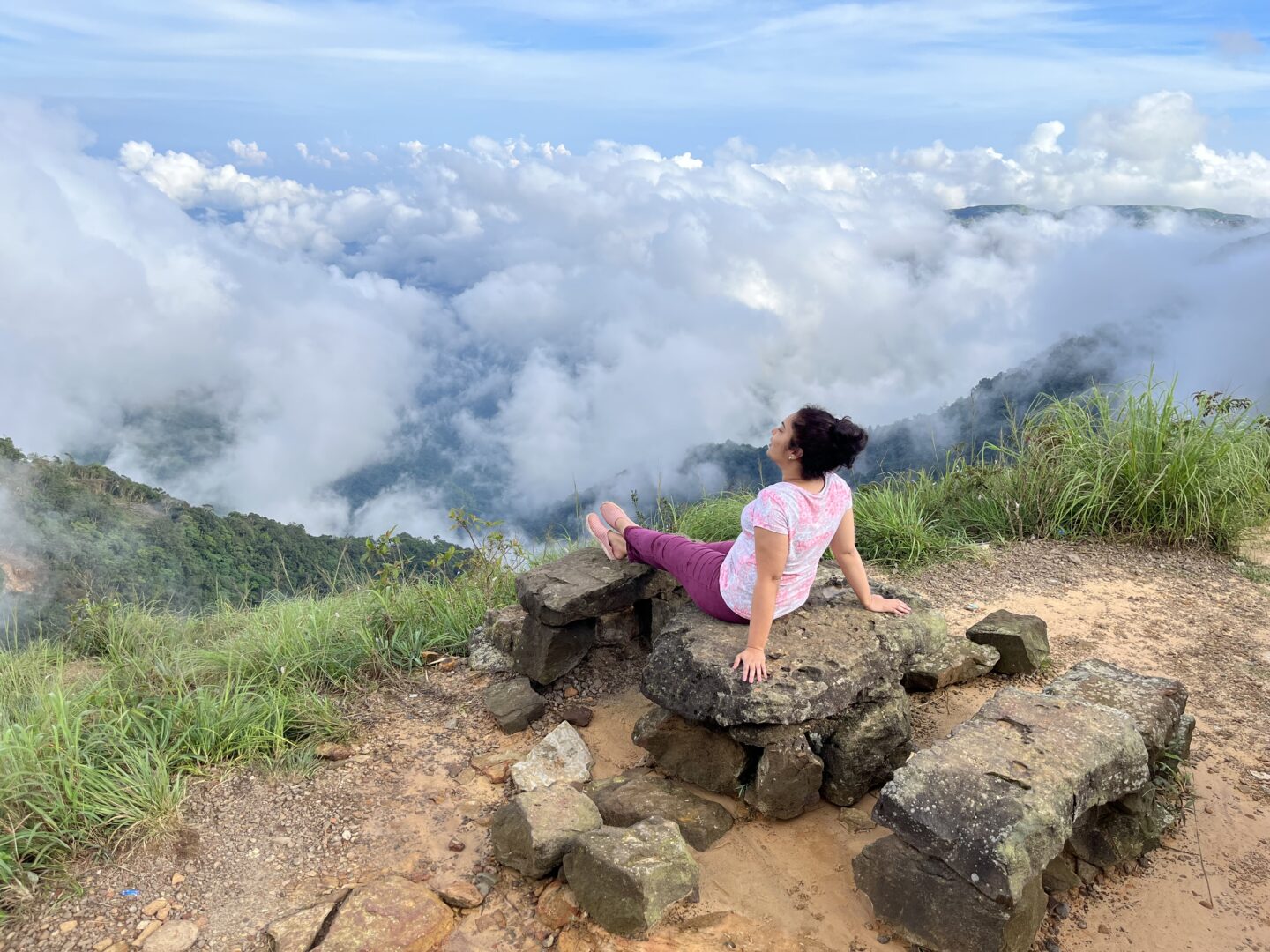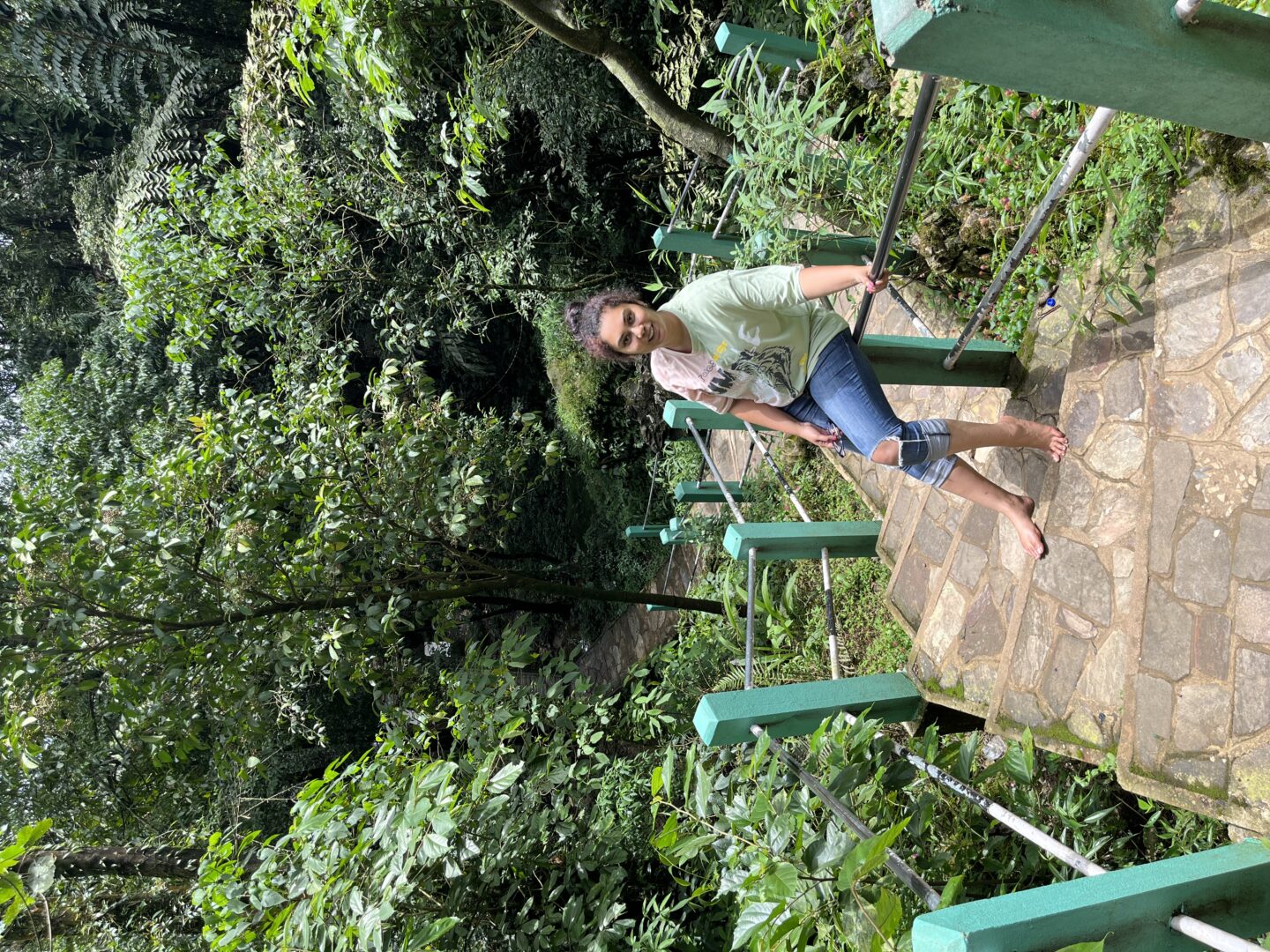A couple of decades ago, I, like most Indian kids, was introduced to Cherrapunji in school. Known as the ‘wettest place on earth,’ it conjured up images of days and nights of non-stop rain, kids playing in the puddles, gushing waterfalls, and dense greenery. I’ve had Cherrapunji on my bucket list ever since then – and this August, 20 years later, I finally ticked it off my bucket list.
If I could describe Cherrapunji (also called Sohra) in three words – root bridges, waterfalls, and clouds would be it. This precious gem of Northeast India is a quaint city about 56 km away from Shillong, the capital of Meghalaya. It was once the wettest place in India (now overtaken by Mawsynram, a village close by), with some of the richest flora and fauna, mysterious caves, and a diverse tribal population. It packs quite the experience. It is common for tourists to make a one-day trip from Shillong to Cherrapunji. You can surely cover some easily accessible waterfalls and caves on a day trip if you are short on time. But if you wish to see a Living Root Bridge in Cherrapunji, which is a man-made suspension bridge built over decades by maneuvering the roots of trees over a river, you would need to stay overnight and make it a 2-day stay, minimum.

I, on the other hand, stayed for 3 days as I had to juggle work and sightseeing. Even though I stayed 3 days, I did not want to attempt the grueling 3600-step trek (one way) to the most famous double-decker living root bridge. I knew I did not have the physical stamina or fitness level to attempt that, or any of the other treks one can embark on in the area. Nonetheless, Cherrapunji still offered plenty of things to do. Here are some fun things to do on your trip.
Things to do in Cherrapunji
Enjoy the Magnificent View of the Seven Sister Falls
The Seven Sisters Waterfall, Nohsngithiang, is a stunning waterfall named after the 7-sister states and is a truly sublime sight to behold. As it tumbles down the Khasi hills, the waterfall segments into 7 streams that all cascade together to create a magical sight. This jewel of the Khasi Hills gushes over limestone cliffs and although the waterfalls will be at their best during the monsoons as that’s when the flow of water will be the strongest, you will most likely not be able to see the falls at all due to the clouds and mist during the monsoons, unless you are very lucky. I passed by 2-3 times during my stay but did not manage to spot it. It is a safer bet to visit after the end of the monsoon. There is no trek required to view these falls and you can park your car and get a glimpse from the road itself.
Exploring Mawsmai Cave
Cherrapunji is known for being the home to more than 200 caves. While you cannot visit each one of them, you should definitely include the Mawsmai Cave in your itinerary. Built of limestone and featuring stalactites, and stalagmites, the journey in the caves is a thrilling experience for those with an interest in geology. Once you buy your entry pass, you hike for about 5 minutes on a cemented path through a wooded area to reach the cave. While the caves are quite large for the most part, they are dark in certain places and there are also spots where you will need to squeeze and crawl through crevices. I should also warn you that the caves smell a little strange – like stone that hasn’t dried in years, mixed with that distinct smell of bamboo shoots (it could be bat-poop). The fastest you can get through the caves would be 15 minutes, and if you are extremely claustrophobic, it’s better you avoid it. Mildly claustrophobic people will be able to get by relatively easily.

There was one opening where I hesitated quite a bit to get through, but seeing a stocky older woman go through it gave me confidence. Mawsmai Caves has yet another cave to explore, but I skipped it and opted to go out into the market and enjoy some delicious sweet corn and pineapples instead. Remember to wear sturdy, waterproof footwear. If they ask you to remove your footwear at the entrance, do so and carry your footwear with you rather than leaving them at the entrance. You will be able to wear it and walk through the caves easier than barefoot. I left my footwear outside, not knowing any better, and the rocky surface of the caves made it difficult to walk on.
Visiting the Legendary Noh Ka Likai Falls
Famously known to be the tallest plunge waterfall in India, the Noh Ka Likai Falls are majestically breathtaking. In the local language Khasi, the term “Noh Ka Likai” signifies the “leap of Likai”. This earthly paradise is associated with a tribal legend of a widow called Ka Likai. The story goes that Likai, a mother, ‘plunged’ from the hills when she found out that her husband had killed their daughter and cooked her flesh. The world’s fourth-tallest plunge waterfall is perfect for birdwatching and adventure sports. You can either choose to do the steep 40-min trek to the top of the falls, visit the waterfall viewpoint that’s a little farther away or trek to the plunge pool itself which may not be for amateurs. However, the views along the highway from Sohra are enough to give you a breathtaking perspective of the majestic falls.
A Walk Through The Wettest Place on Earth – Mawsynram
A stone’s throw away from Cherrapunji, the scenic village of Mawsynram makes for the perfect day trip. It’s located 69 km from Shillong and is known as the wettest region of India. This is because it gets the highest amount of rainfall in the entire country which can be as much as 470 inches. You can add a touch of romance to your time in Mawsynram by heading out to dance in the rain. Apart from that, Mawsynram is well-known for its stalagmite caves, populations of Hoolock Gibbon (the only species of ape found in India) in the Phlangwanbroi jungles, the Krem Dam that has an underground waterway, and the adventure sports (such as kayaking, mountain biking, and zip lining) in Mawlynnong.
Visit Wakaba Falls
This was one of the first sights I saw on the way from Shillong to Cherrapunji. I almost considered not going as I hadn’t come across the name when I was researching things to do in Cherrapunji, but I’m glad we stopped! Like most things to do here, you will have to pay a small entrance fee and climb down maybe 150-200 rocky steps to get to Wakaba (also called Wah Kaba) Falls. This small three-tiered waterfall is surrounded by vegetation and boulders and the crystal-clear water is freezing cold. There is also a small seating area mid-way up to the parking lot where you can rest and take in the gorgeous views of the valley (the photo of the view is added as the first photo in this blog post).
Visit Arwah Caves
One of Meghalaya’s most popular caves, the Arwah Caves is located just outside Cherrapunji at the end of a drive on a bumpy mud road. A short, pleasant walk will lead you to this massive chamber of caves famed for fossils of fishbones and crustaceans in the limestone. These caves are well-lit and well-maintained. Dip your toes in small streams that have been running through the caves for millennia, marvel at the stalactites and stalagmites, and enjoy the feeling of exploring the unknown. Unlike Mawsmai Caves, Arwah Caves are large and spacious. There is no separate exit here, and you will need to leave the same way you came in.
Don’t miss Dainthlen Falls
Yet another chance discovery, Dianthlen Falls was perhaps my favourite, especially because there is no trek involved! It was located around 40 minutes from our hotel and in the opposite direction of all the other attractions. Upon driving on roads that ranged from paved to non-existent (and upon questioning if we were lost several times), we found the car on a large rocky plain. What’s different about these waterfalls is that you find yourself – not at the base or the middle, but on the top. There are dozens of small rocky pools of water that you can sit near and dip your legs in, or, if you can bear cold water, you can even sit in a little pool of water and enjoy the views. Only a part of the edge of the cliff has railings, so ensure not to venture off to areas that are not behind railings for your safety.
An Adventurous Trek to the Double-Decker Living Root Bridge
The intricate design and formation of the living root bridge offer visitors a unique perspective on the many marvels of nature. The age-old architecture stands tall and strong without any use of artificial cement. It was created and continues to be maintained by the locals. They guide the roots of living trees to create a steady connection from one side of the river to the other, being able to hold the weight of a few humans at a time.
These bridges offer a powerful glimpse into the beauty of humans’ relationship with nature and how it is possible to survive by solely depending on it. While there are plenty of living root bridges in Cherrapunji, the double-decker living root bridge offers one of the most adventurous treks among them all, so if you are a trekking enthusiast, make a trek to the magnificent double-decker living root bridge which involves a hike of around 3,600 steps, one way. After the descent, very few have the strength and will to climb back up the same day. There is extremely basic accommodation run by locals where you can relax for the night and ascend the next day. Like I said earlier, I did not do this trek or see the double-decker living root bridge in Cherrapunji, however, I did see the living root bridge in Asia’s cleanest village – Mawlynnong.
There you have it – the best things to do in Cherrapunji. If you are someone who possesses good physical strength and stamina, Cherrapunji has tons of things for you to do and explore. But even if you don’t like trekking, you can still enjoy the surreal beauty and charm of this bucket list destination in Meghalaya.
Drop me any questions you may have in the comments below and be sure to follow along on new adventures on Facebook, Twitter, and Instagram.